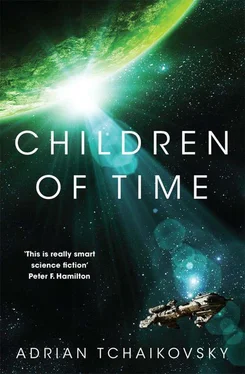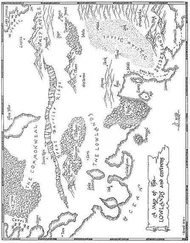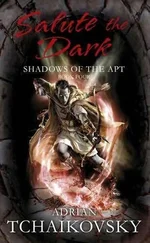Then, a few years later, the second signal ceased to vary and settled on a single repeated transmission, over and over, and this again led to a mass of speculation across what had by then become a loose-knit global community of priest-scientists. Again and again the signal was parsed for meaning, for surely a message repeated over and over so many times must be important.
There was one curious school of thought that detected some manner of need in the signal, and quaintly fancied that, out there through the unthinkable space between their world and the source of that second message, something lost and desperate was calling for help.
Then the day came when the signal was no more, and the baffled spiders were left staring blankly up into a heaven suddenly impoverished, but unable to understand why.
When he was a child, Holsten Mason had been mad about space. The exploration of Earth’s orbit had been ongoing for a century and a half by then, and a generation of astronauts had been raiding the fallen colonies, from the lunar base to the gas giant moons. He had immersed himself in dramatic reconstructions of bold explorers entering dangerous derelict space stations, avoiding the remaining automated systems to pillage tech and data from the burnt-out old computers. He had watched actual recordings of the real-life expeditions – often disturbing, often cut off suddenly. He remembered, at no more than ten years old, seeing a helmet torch play over the vacuum-desiccated corpse of a millennia-old spaceman.
By the time he was grown up, his interest had migrated back through time from those bold scavenger pioneers to the lost civilization that they were rediscovering. Those days of discovery! So much had been hauled back down from orbit but so little of it was understood. Alas, the golden days of the classicist were already on the wane when Holsten had begun his career. He had lived to see his discipline steadily tainted by vicarious disgrace; there was less and less still to be gleaned from the scraps and splinters which the Old Empire had left behind, and it had become evident that those long-dead ancestors were still present, in a malign, intangible way. The Old Empire was reaching out of deep history to inexorably poison its children. Small wonder that the study of that intricate, murderous people gradually lost its appeal.
Now, at an inconceivable distance from his dying home, Holsten Mason had been handed the veritable grail of the classicist.
He sat in the comms room of the Gilgamesh , completely surrounded by the past, transmission after transmission filling the ark ship’s virtual space with the wisdom of the ancients. As far as he was concerned, they had struck gold.
He was one of the few Key Crew able to participate from the comfort of the Gilgamesh itself. Karst and Vitas had taken a shuttle and some drones to check out the barren-looking planet below them. Lain and her engineers were out on the half-finished station itself, slowly proceeding down its compartmentalized length and recording everything they found. When they found working hardware they could access, they sent Holsten the results, and he deciphered and catalogued it wherever he could, or put it aside for further study where he could not.
Nobody had ever had access to an Old Empire terraforming station before, even an incomplete one. Nobody had ever been sure that such a thing actually existed. Here, at the wrong end of his career, and at the wrong end of the history of the human race, Holsten was finally in the undeniable position of being able to call himself the greatest expert ever on the Old Empire.
The thought was intoxicating, but its aftertaste one of bleak depression.
Holsten was now in possession of a greater trove of communications, fiction, technical manuals, announcements and trivia in several Imperial languages – but mostly Kern’s Imperial C – than any scholar before him since the end of the Empire itself. All he could think was that his own people, an emergent culture that had clawed its way back to its feet after the ice, was nothing but a shadow of that former greatness. It was not simply that the Gilgamesh and all their current space effort was cobbled together from bastardized, half-understood pieces of the ancient world’s vastly superior technology. It was everything : from the very beginning his people had known they were inheriting a used world. The ruins and the decayed relics of a former people had been everywhere, underfoot, underground, up mountains, immortalized in stories. Discovering such a wealth of dead metal in orbit had hardly been a surprise, when all recorded history had been a progress over a desert of broken bones. There had been no innovation that the ancients had not already achieved, and done better. How many inventors had been relegated to historical obscurity because some later treasure-hunter had unearthed the older, superior method of achieving the same end? Weapons, engines, political systems, philosophies, sources of energy… Holsten’s people had thought themselves lucky that someone had built such a convenient flight of steps back up from the dark into the sunlight of civilization. They had never quite come to the realization that those steps led only to that one place.
Who knows what we might have achieved, had we not been so keen to recreate all their follies , he thought now. Could we have saved the Earth? Would we be living there now on our own green planet?
All the knowledge in the universe now at his fingertips, yet to that question he had no answer.
The Gilgamesh had translation algorithms now, mostly designed by Holsten himself. Previously the sum total of the ancients’ written word had been so scarce that automatic deciphering had been infinitely hit-and-miss – he would still not have liked to have any conversation with Avrana Kern via a translation by the Gilgamesh , for example. Now, with a library of miscellanea at his fingertips the computers were working with him to turn out at least halfway comprehensible versions of Imperial C. Most of the treasure trove of knowledge remained locked within ancient languages, though. Even with electronic help, there simply wasn’t time to decode it all, and most likely the bulk of it was simply of no interest to anyone but himself. The best he could do was get an idea of what each separate file represented, catalogue it for future reference, and then pass on.
Sometimes Lain or her people would contact him with questions, mostly about tech they had found but which seemed to serve no obvious purpose. They would give him vague search terms and send him digging through his own directories for something that might pertain to it. More often than not, his organization and the wealth of material eventually yielded something of use, and he would set out a working translation of it. The fact that they could have looked for themselves was something he occasionally commented on, but it was plain that the engineers felt actually skimming Holsten’s catalogue was far more difficult than just pestering him about it.
To be honest, he had hoped to get some talk of a more social nature with Lain but, in the forty days he had been awake this time round, he had not so much as met her face to face. The engineers were busy, actually living out there on the great hollow cylinder of the station most of the time. They had thawed out and awoken an auxiliary crew of thirty trained people from cargo to help them, and still there was more work to be done than they could keep up with.
Six people had died: four to what had either been a working security system or a defective maintenance system, one to a suit malfunction, and one to sheer clumsiness, by managing to get their suit cut open whilst trying to hurry equipment through a jagged gap in the station infrastructure.
Читать дальше












